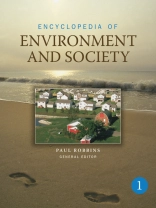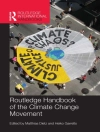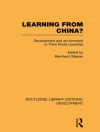‘As befits the topic, this beautifully packaged, wonderfully illustrated, interdisciplinary resource has more than 1200 entries written by specialists. A helpful reader′s guide groups topics like agriculture, conservation and ecology, movements and regulations, politics, pollution, and society. A resource guide, chronology, glossary, and list of the UN′s economic indicators complete the set.’
—Library Journal
‘…this important work gives a well-focused snapshot of environmentalism in the early 21st Century, and it will remain valuable into the future both for its content and as a yardstick to measure progress toward sustainability and conservation. Summing Up: Recommended. Undergraduates and general readers.’
—CHOICE
Booklist Editors′ Choice 2008
‘This superb interdisciplinary work should find a place on the shelves of every public and academic library that has the least bit of interest in environment issues—which should mean just about all.’ —Booklist (Starred Review)
The
Encyclopedia of Environment and Society brings together multiplying issues, concepts, theories, examples, problems, and policies, with the goal of clearly explicating an emerging way of thinking about people and nature. With more than 1, 200 entries written by experts from incredibly diverse fields, this innovative resource is a first step toward diving into the deep pool of emerging knowledge. The five volumes of this
Encyclopedia represent more than a catalogue of terms. Rather, they capture the spirit of the moment, a fascinating time when global warming and genetic engineering represent only two of the most obvious examples of socio-environmental issues.
Key Features
- Examines many new ideas about how the world works, what creates the daunting problems of our time, and how such issues might be addressed, whether by regulation, markets, or new ethics
- Demonstrates how theories of environmental management based on market efficiency may not be easily reconciled with those that focus on population, and both may certainly diverge from those centering on ethics, justice, or labor
- Offers contributions from experts in their fields of specialty, including geographers, political scientists, chemists, anthropologists, medical practitioners, development experts, and sociologists, among many others
- Explores the emerging socio-environmental problems that we face in the next century, as well as the shifting and expanding theoretical tools available for tackling these problems
- Covers regions of North America in greater detail but also provides a comprehensive picture that approaches, as effectively as possible, a cohesive global vision
Key Themes
- Agriculture
- Animals
- Biology and Chemistry
- Climate
- Conservation and Ecology
- Countries
- Geography
- History
- Movements and Regulations
- Organizations
- People
- Politics
- Pollution
- Society
Packed with essential and up-to-date information on the state of the global socio-environment, the
Encyclopedia of Environment and Society is a time capsule of its historic moment and a record of where we stand at the start of the 21st century, making it a must-have resource for any library. These inspiring volumes provide an opportunity for more new ways of thinking, behaving, and living in a more-than-human world.
Tabla de materias
Communism – Justin Corfield
Danube River – Justin Corfield
Dust Bowl – Justin Corfield
Easter Island – Justin Corfield
Ehrlich, Paul R. – Justin Corfield
Grand Canyon – Justin Corfield
Great Barrier Reef – Justin Corfield
Hoover Dam – Justin Corfield
India – Justin Corfield
Lewis and Clark Expedition – Justin Corfield
Native Americans – Justin Corfield
Nature Writing – Justin Corfield
Orientalism – Justin Corfield
Rivers – Justin Corfield
Suburbs – Justin Corfield
Sugar – Justin Corfield
Sobre el autor
Paul Robbins is professor of Geography at the University of Arizona and is known for his interdisciplinary views of how geography interrelates with other disciplines. He has written and edited several books including the best selling textbook ‘Political Ecology: A Critical Introduction’ (Blackwell 2004) and the recent ‘Lawn People: How Grasses Weeds and Chemicals Make Us Who We Are’ (Temple University Press 2007).












